- Home
- Belva Plain
Evergreen Page 4
Evergreen Read online
Page 4
“Why didn’t you, then?”
“I had to go to work,” he said shortly. “Tell you what, there’s a place over on West Broadway that’s pretty good, we could have supper there. Soup, stew and pie for thirteen cents. Not bad, with a schooner of beer thrown in. Will you go with me?”
“Yes, but I don’t drink beer. You can have mine, too.”
Ruth said: “One good thing about this country is you don’t have to have money to get married. It’s not like the other side. Of course, some people still go to marriage brokers, but modern people don’t. You like each other, you get married. You both work.” And when Anna did not answer, she said: “Tell me about you and Joe.”
“Joseph. Nobody ever calls him Joe.”
“And why not?”
“I don’t know. But Joseph seems to fit him. It’s more dignified.”
“All right, then, Joseph. Tell me about you and him.”
“There’s nothing to tell.”
“Nothing!”
“Well, I like him. But there’s no—” Anna looked for a word. “Fire. There’s no fire.”
Ruth threw her hands up. Her eyes and brows moved upward. “So why do you go with him?”
“He’s a friend. It’s lonesome without a friend.”
Ruth looked at her. I might as well have spoken in Chinese, Anna thought.
“You know how many people around here have never even been north of Fourteenth Street?” Joseph had asked Anna.
“I’m one of them.”
“Wait, then, I’m going to show you something.”
The slippery cane seats were cool and the spring breeze ran along with the trolley car as it gathered speed up Lexington Avenue. The bell clanged with authority. When the car stopped at the corners one could see on the side streets row after row of narrow houses, all brownstone, with high steps and tubbed evergreens at the front doors. Hester Street was a thousand miles away.
“We’ll get out at Murray Hill and go over to Fifth,” Joseph said.
They walked through the quiet streets from sun to shade, from shade to sun. Now and then a carriage passed; the horses had glossy hair and braided tails.
“Going for a ride in Central Park,” Joseph explained. Anna was surprised that he knew so much about this part of the city.
A motorcar stopped in front of one of the houses. The lady in the back seat wore a wide hat tied with a veil. The driver, in uniform and leather boots, walked around and helped her out of the car. She had two small fawn-colored dogs, one under each arm. Then the house door was opened from inside and a young woman came down the steps. Her dress was narrowly striped in blue and white; her little apron was edged with lace and her cap matched it. She took the two dogs and followed the lady up the steps.
“There! What do you think of that?” Joseph asked.
“Oh, it’s nice here!” Anna said. “I never imagined anything like this.”
“This is nothing. Wait till you see Fifth Avenue. That’s something to see!”
The sunshine glowed. The trees in the park across the avenue at Fifty-ninth Street glowed green and gold.
“That’s the Plaza Hotel,” Joseph said. “And on this side, this is the famous Hotel Netherlands.”
A young man wearing a straw hat (“That’s called a ‘boater,’” Joseph said) came out under the awning. The girl with him wore a bunch of violets on her coat, a beautiful coat, pale as the inside of a peach. They crossed the avenue walking swiftly, going somewhere. Anna and Joseph ambled along behind them, going nowhere in particular. When the policeman’s whistle blew, the traffic started up and they were stopped on the concrete island where General Sherman, larger then life, reined in his horse.
“Some statue, hey?” Joseph said.
Anna read the inscription. “That’s the Union general who burned all the houses when he marched through Georgia during the Civil War.”
Joseph was astonished. “I never heard about him! I know about the Civil War, of course, but how do you know so much?”
“History. I’ve a book of American history,” Anna said with pride.
Joseph shook his head. “You’re something, Anna, you really are.”
Beyond General Sherman stood a great house of red brick and white stone, with iron gates. “The Vanderbilt mansion, that is. Or one of them, I should say.”
“That’s not a hotel?”
“It’s a house. A family lives in there.”
She thought he was joking. “One family? It’s not possible! There must be a hundred rooms.”
“I’m telling you the truth.”
“But how can they be so rich?”
“This particular family made it in railroads. All up and down this avenue I could show you dozens of houses like this. Fortunes made in oil, steel, copper, and some just from owning land. You know where you live downtown? A lot of those tenements are owned by people who live here. When people like us pay rent it goes to these people here.”
She thought of the crumbling house on Hester Street. “Do you think that’s right?”
“Probably not. Or maybe it is, I don’t know. If they’re smart enough to get it, maybe they’re entitled to it. Anyway, that’s how the world is, and until a better world is made I’ll adapt to this one.”
Anna was silent. And Joseph went on, his voice rising with excitement, “I’m going to live like this someday, Anna. Oh, not in a palace like these, but uptown in one of those nice places on the side streets. I’m going to do it, mark my words.”
“You are? But how?”
“Work. Buy land. Land is the key to wealth, you know, as long as you own it free and clear. Its value may go down for a time but it always rises again. This country is growing, and if you can hold on to land you’re bound to be rich.”
“How do you get the money to start?”
“Ah, that’s the question! I’m trying to save enough for a small house of flats, but it’s hard.” He said stubbornly, “I’ll do it, though. I’ll live like this one day if I have to break my back.”
The fierceness that she saw in him disturbed Anna. He hadn’t shown it like that before. All of a sudden he seemed too angry and too large, although he was not a large man at all. His voice was too loud. She thought windows would open and people lean out to look, although no one did.
She said quietly, “You think too much about money.”
“You think so? I’ll tell you something, Anna. Without money the world spits on you. You’re nothing. You die like my father in a dirty little shop. Or rot away like Ruth and Solly. You want to rot away like that?”
“No, of course not.” One shuddered to think of it. But still it couldn’t all be as he said. “The great writers, the artists, they had no money. And the world honors them. You make everything too cruel, too ugly.”
Joseph turned her face up to his. His eyes were suddenly soft. “You look about fifteen years old, Anna,” he said gently.
The idea came to her on a stifling night, when the smell of frying hung in the airless rooms. The hair at the back of her neck was wet with sweat; she longed for a bath in cool water. But there was no place, no privacy. Other women walked in while you were meagerly sponging off. Some of these women disgusted her; they weren’t clean. And one poor creature cried and whimpered into her pillow all night. Ruth’s five-year-old was sick and restless. It was impossible to sleep.
She thought of the maid coming down the steps of the house with the tubbed evergreens. On the ship crossing the Atlantic, some of the peasant girls had talked of the jobs that waited for them in America, jobs in neat, clean houses like the ones uptown. In such a house she would sleep quietly, and have a place to keep a shelf of the books which Miss Thorne had given her, maybe even save money and buy some more for herself at second hand. After all, there would be no rent to pay and no food to buy. One could live decently, one could walk on those fine streets. She lay awake, thinking and thinking, and at last made up her mind.
“Ruth says I’m crazy to go to work as a serv
ant,” she told Joseph, a few days later.
“Why so? It’s honest work. Please yourself, Anna, not other people,” he told her.
6
This, then, was how they looked inside, these houses behind the long windows where the shades, demurely pulled, were like downcast eyelids in a quiet face. Velvet carpets; your footsteps made no sound. Pictures in gilded frames. Fresh roses, cream and pink, although it was September. And stairs, turning up and up again. Anna followed Mrs. Werner.
“We’re a small family. My daughter is married and living in Cleveland. So there are just Mr. Werner and I and our son, Mr. Paul. This is his room.” She opened a door and Anna saw books on crowded shelves, riding boots in a corner and over the mantel a large blue banner: For God, for Country and for Yale.
“They’re all Yale men in our family. Mr. Paul won’t be home from Europe till next week but I’d like to have the room dusted every day all the same. Now, on the top floor is your room.” They mounted the stairs again; more dark railings and no carpet on this flight. “This front room we use for the seamstress. She comes for two or three weeks every spring and fall to do my clothes. Back here is Cook’s room and yours is next to it.”
The two rooms were identical: a neat bed, a dresser, a straight wooden chair. Cook’s room had an enormous wooden crucifix above the bed. Unbelievable. Rooms like this, all for one person. With electric lights. Even a bathtub for the maids, a high white bathtub on claw feet.
“Do you think you would like the position?”
“Oh, I would, I would.”
“Very well. The wages will be fifteen dollars a month. Ordinarily I pay twenty, but you have no experience, you’ll need to be taught. Have you any questions?”
“No.”
“Anna, it is proper to say, ‘No, Mrs. Werner.’”
“No, Mrs. Werner.”
“Do you want to start today?”
“Oh, yes! Yes, Mrs. Werner.”
“Then you may go back and get your things. It’s eleven o’clock now—let me see—I shan’t be needing the car until two. Quinn can drive you down.”
“In a machine?”
“Yes. It’s a miserable trip in the trolley carrying heavy parcels.”
“I haven’t got very much. Just my clothes and my candlesticks.”
“Oh?”
“They were my mother’s. They’re very valuable.”
“Well, bring them, then, of course.” There was a touch of amusement, not unkind, at the corners of the lady’s mouth.
The cleanness of it. First the bath, the high tub filled with hot, hot water. Anna almost fell asleep in it. Then the fresh clean bed all to herself; she could turn, she could spread her arms and legs to the very edge.
Her mind went back over the day. The ride in that car, all closed in; it was like a little room, lined in pale sand-colored cloth as smooth as silk. A rug of dark gray fur with a big W sewn on it. Quinn the chauffeur sat outside without a roof. He didn’t talk to me. I think he didn’t like going down to Hester Street with all those people staring at the car. There was hardly room for it because of the pushcarts. Then the children started climbing on the car and Quinn got angry. But he did help me with my boxes.
I wish Joseph had been there to see that car. Ruth said again that I was crazy to give up my freedom to be a servant, but I can’t see what freedom she has. And if I stayed there, I’d only get like her. Still, I shall miss her.
“How is it that you are called Mrs. while I am called by my name?” Anna inquired of the cook in the morning.
“The cook is always called Mrs.,” replied Mrs. Monaghan. “You’re the first Jewish housemaid we ever had here, you know that? Even though the family’s Jewish.”
Anna was astonished. “The Werners are Jewish?”
“Of course they are, and grand people, too. I’ve been here seven years now. My sister-in-law told me I was making a mistake to work for Jews but I’ve never regretted it. A lady and a gentleman, and no doubt about it.”
“I’m glad to hear that,” Anna said stiffly.
“And did you sleep well, I hope? Your first night in a place, it’s hard to sleep.”
The coal fire, which had been banked all night, flared up. Something with a smoky pleasant smell was frying in a pan.
“What’s that?” Anna asked.
“That? Why, bacon, of course. What’s the matter?”
“But you said these are Jewish people! How can they eat bacon?”
“I’m sure I don’t know. Ask them. Mister has bacon and eggs every morning. She only has a cup of tea, toast and marmalade in her room. I’ll show you how to fix her tray, and you’re to take it up at a quarter past eight. You’ll have to step lively, there’s no time to waste in the morning.”
“I can’t eat bacon,” Anna said, the acid of nausea in her mouth.
“Well, don’t eat it!” Then Mrs. Monaghan’s face brightened. “Oh, it’s your religion, ain’t it? You’re not allowed to.”
“No,” Anna said.
“And why would that be?” Mrs. Monaghan asked, flipping the bacon.
“I don’t know. It’s not allowed. It’s bad.”
Mrs. Monaghan nodded sympathetically. “Now, the butcher boy will be ringing in the areaway to take the order for dinner. The family will be having duckling and, seeing that it’s Friday, I’ll be having fish.”
“Why must you have fish because it’s Friday?”
“Well, our Lord died on a Friday, you know.”
Anna wanted to ask about the connection between fish and the death of the Lord. But the bell sounded in the pantry and Mrs. Monaghan scurried.
“Heavens, she’s early this morning! Here, reach me a cup and saucer, the blue and white china. And put the New York Times on the tray! Oh, for pity sake, that’s the iceman ringing! Answer, will you? Tell him fifty pounds, there’s a good girl—”
It wasn’t hard to learn the life and ways of the house. Open the door and take the lady’s coat, the gentleman’s hat and stick. Serve from the left and remove from the right; don’t chip the china or the crystal. Water the flowers; don’t spill a drop on the tables, it turns the wood white. Bring in the tea things at five o’clock: remember Miss Thorne? Mrs. Werner and her friends come in from shopping; the chill air enters on their furs; their perfume smells like sugar. Learn how to use the telephone; you crank it on the wall, you give the number to central and put your mouth close to it when you talk. Be sure to write all messages accurately on the pad.
And when you are all finished in the evening, you may go up to your room, your own private room, with the row of books standing on the dresser. You can lie in bed and read, finish The Cloister and the Hearth—what a wonderful story! … and even have an orange or a bunch of grapes.
“Might as well eat them,” Mrs. Monaghan says, “before they go bad.”
“Yes,” Mrs. Monaghan says, resting her elbows on the kitchen table, “rich people is queer, all right. The Mister’s folks has got a place in the Adirondack Mountains, a big homely house made out of logs, like those pictures of Lincoln’s cabin, only big. You look out the windows and all you can see is the lake and trees, not a living soul for miles. Gives you the positive creeps, I wouldn’t pay a penny for it. Takes you all night to get there from here. You go up in a sleeper. Though I must say, that part of it is kind of an adventure.
“They was awfully good to my nephew Jimmy! After he broke his leg they took him and his sister Agnes up there with us for the whole summer. Jimmy and Mr. Paul is the same age, you know. They had a great time. When they was kids, I’m talking about. Jimmy works in a garage now and Mr. Paul’s in the family bank. Did you know they own a bank? Big place, Quinn says. On Wall Street or somewheres.
“You’ll like Mr. Paul, he’s that nice and easy to like. They say he’s smart, but he’s that plain, you’d never know it. Except he keeps buying books all the time. There’ll be no more room in the house for them soon, I’m thinking.”
It is a treasury of books. Anna
always takes her time doing his room. There are antique books on yellowed paper, in tiny print. There are volumes of vivid art: columned marble archways, palaces; mothers and children; women naked under casual scarves; even pictures of the cross and the hanging man (the peaceful expression while the blood oozes from the hands and feet!). Anna turns those pages quickly.
What kind of man is he who owns all these?
He arrives home early in September, taking the front steps two at a time, followed by Quinn and a pile of cases labeled: Lusitania, First Class.
It comes to Anna, standing in the front hall with the family, that she must, without thinking, have expected him to resemble his parents, to move neatly in small spaces as they do, to measure his speech neatly.
He moves, instead, like someone striding fields, too loose a person for narrow halls. His bright blue eyes (surprising eyes in a dark face!) look as if they have just finished laughing. He has brought presents for everyone and insists now on giving them out immediately.
“Perfume?” says Mrs. Monaghan. “And where would I be wearing perfume, an old woman like me?”
“To church, Mrs. Monaghan,” Mr. Paul says firmly. The blue eyes twinkle: Funny old soul, isn’t she! “There’s no sin in bringing the smell of flowers to your prayers. Doesn’t the Virgin herself wear flowers?”
“Oh, the glib tongue of him!”
“And a bottle for Agnes; she hasn’t entered the convent yet, has she?”
“Not yet, and I don’t think she will, although it’ll break her father’s and mother’s heart if she don’t.”
“Oh, I hope not, Mrs. Monaghan.” The laughter leaves his face. He says seriously, “Agnes must do what she must with her own life. That’s her right and she oughtn’t feel guilty about it.”
Anna lies in bed that night unable to sleep. She thinks she hears her heart pounding. Whichever way she lies, on either side or on her back, she feels her heart. It seems to her suddenly that the world is full of sharp and beautiful excitement, that it will pass by. She is missing it all, she will work and die, having missed it all.

 The Golden Cup
The Golden Cup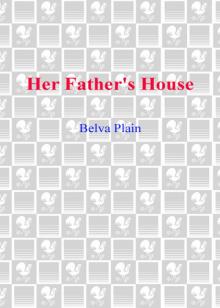 Her Father's House
Her Father's House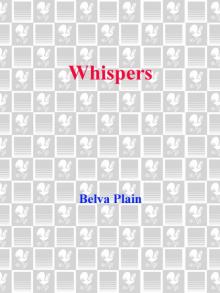 Whispers
Whispers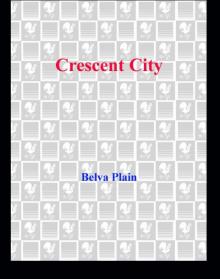 Crescent City
Crescent City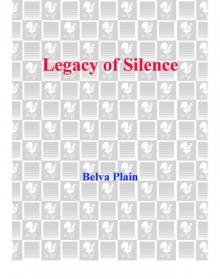 Legacy of Silence
Legacy of Silence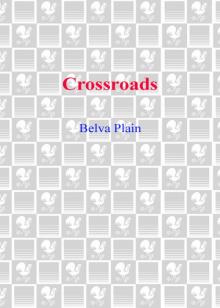 Crossroads
Crossroads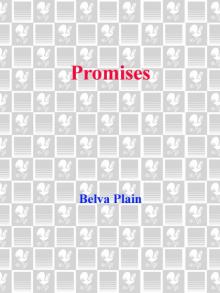 Promises
Promises After the Fire
After the Fire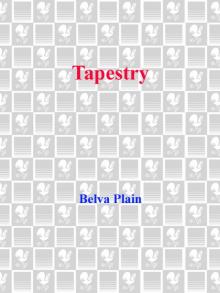 Tapestry
Tapestry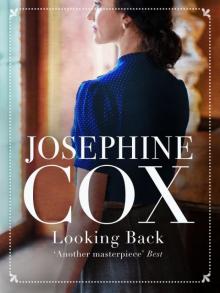 Looking Back
Looking Back Heartwood
Heartwood The Carousel
The Carousel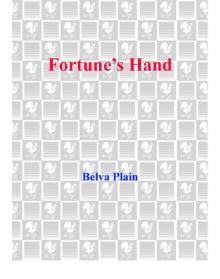 Fortune's Hand
Fortune's Hand Homecoming
Homecoming Random Winds
Random Winds Harvest
Harvest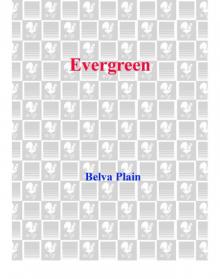 Evergreen
Evergreen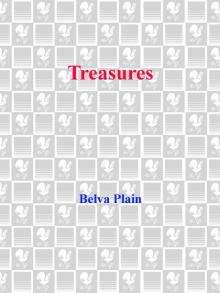 Treasures
Treasures The Sight of the Stars
The Sight of the Stars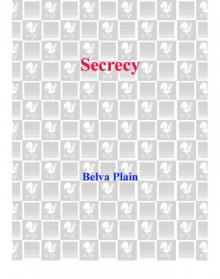 Secrecy
Secrecy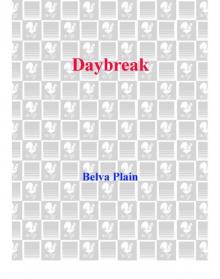 Daybreak
Daybreak Eden Burning
Eden Burning